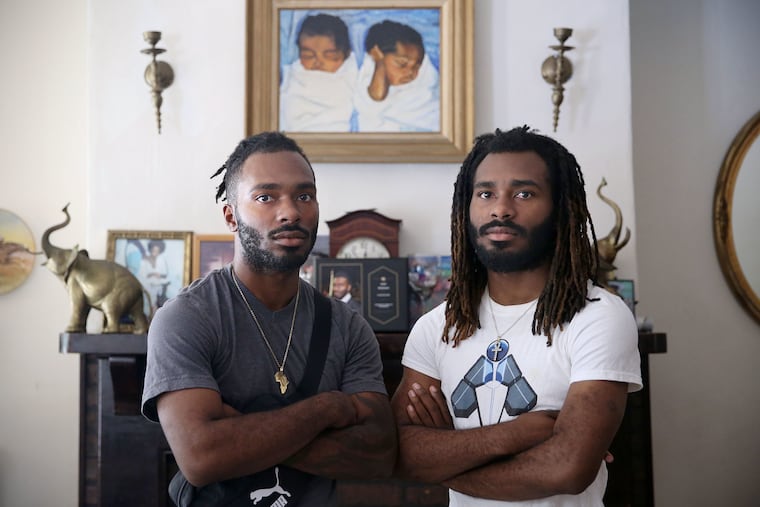They were born minutes apart, and were shot minutes apart last year on July 4th. | Helen Ubiñas
Twin brothers who were shot within minutes of one another fight to overcome shared trauma.

Julius and Julian Whitehead were born minutes apart. And, last year on Independence Day, they nearly died minutes apart.
Identical twins, their bond had seen them through everything over 28 years: sickness, the sudden passing of their father, the dangers of their neighborhood. But after both were shot in front of their Harrowgate home on July 4, 2018, even that bond sometimes failed to pull them from the depths.
Julius is older by about 11 minutes, which cemented his role as protector. So, when Julian got a call that night that their neighbor was outside, in a fight and needed help, Julius yelled at his brother to wait. Julius had just gotten home from work, still in his uniform as a SEPTA paratransit driver. He’d only managed to get his shirt off before rushing out after his brother.
Julian stepped into the middle of the fight.
Julius chased away the man fighting their neighbor, but not before the guy promised he’d return, with backup.
He did, with a few more guys. One had a gun.
Julius had a gun, too. He was licensed to carry.
As he watched the men walk toward them, what he remembers thinking was “Somebody loves them, too.” He didn’t shoot first.
He called out: “Why you bring a gun?”
Julian, who grew up boxing and studying martial arts with his brother, told the men they could settle everything with their fists.
A few punches were thrown before Julian’s ears rang from a loud boom.
He remembers feeling a bullet burn across his chest and thinking: “Can you stop? Can you stop? Can you stop?” It didn’t until it struck both lungs and lodged itself in his right bicep.
Julius saw his brother fall and thought he was dead.
“All I could think about is that they had killed my brother.”
More gunshots, and then Julius, too, was hit. He felt his left leg go stiff almost instantly.
Their mother, Juliette, rushed from the house to see what happened, then screamed for someone to help drag her sons into the house. Police came fast. They grabbed Julius from the steps, loaded him into their squad car, and rushed to the hospital.
“There’s one more!” the mother yelled from inside the house.
At Temple University Hospital each brother fought for his life. Julian wouldn’t discover his brother had also been shot until he regained consciousness. When they stabilized, they asked to be put in the same room — they had always done better together. Even as kids when they suffered from asthma, they recovered faster if they weren’t far apart.
Both in the hospital and then back home, they struggled together.
There were nightmares, flashbacks. Julius, whose leg suffered severe nerve damage, sank deep into anxiety, depression, and paranoia. He had prided himself on his job, his car, and his credit score. All were gone. Gone, too, were the days when he’d wake up early and work on his comic book before heading to work. He holed up in his room, playing video games, and then slept the day away. Julian tried to talk him back, but he, too, was struggling.
“The shooting destroyed our family,” their mother said.
And then last month, a knock at the door.
Their mother had called Scott Charles, trauma outreach coordinator for Temple University Hospital, and Melany Nelson, executive director of Northwest Victim Services.
There may have been an eye roll, Julius concedes, when Julian walked upstairs to tell him they had visitors. But Nelson was a nice lady who had been working hard to get them services. And Charles had been cool with them at the hospital, breaking down how it made sense that they were suddenly, inexplicably, into oldies music. It reminded them of their father, who’d recently died, and a time when they felt happy and safe.
They felt neither since the shooting.
And then Charles said he had an assignment for them: Go back to what made them happy before they were shot. Comics for Julius, martial arts for Julian. A few more eye rolls; internal ones — they were brought up to be polite, after all.
But then about a week later, Julius went to nearby Amalgam Comics. Julian visited his martial-arts school. Julius started going to sleep earlier, so he could wake up and work on his comic book. He’s hoping to get another car and a job that’s not as physically demanding. He’s determined to restore his credit score. Julian, a recent respiratory-therapist graduate, is hoping to move into his own place with his girlfriend and their 1-year-old daughter. He wants Julius to come, too.
They sent Charles pictures as proof of an assignment completed, and a thank you, selfies of twin brothers closer to finding themselves again.